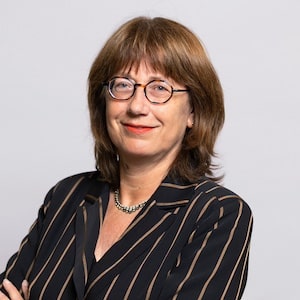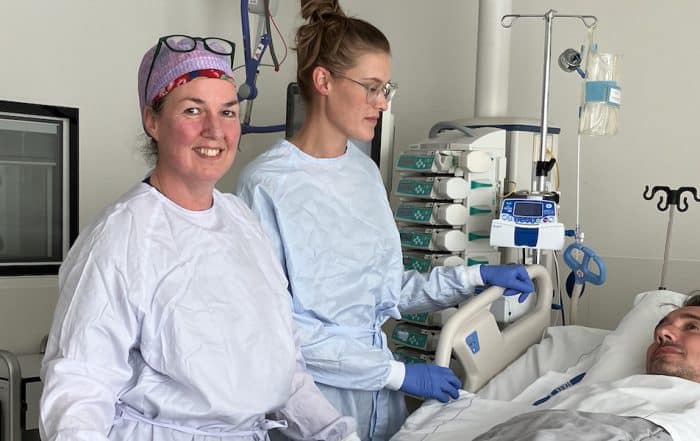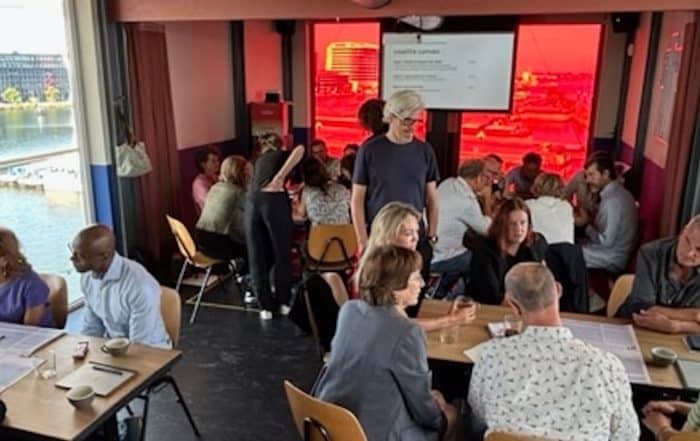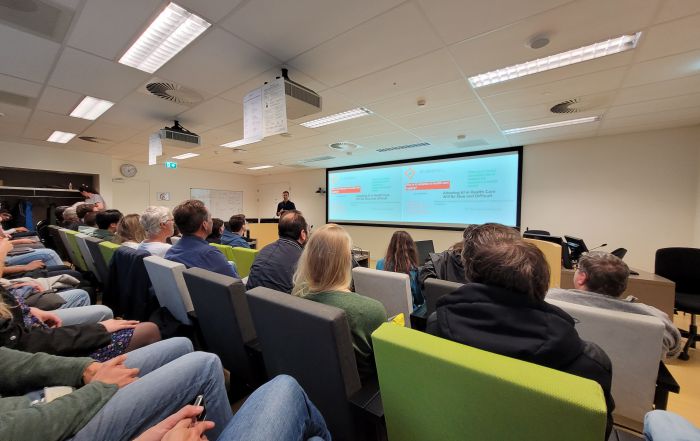Amsterdam het internationale centrum van digitale inclusieve zorg
Hoe zetten we digitale technologie succesvol in voor zorg en welzijn, met oog voor inclusie? Dat thema stond centraal bij het Zorg2025-event in oktober. “Ons doel is dat Amsterdam het internationale centrum van digitale inclusieve zorg wordt.”
Amsterdam Economic Board, ahti, Amsterdam AI, de Rabobank, ROM InWest en Sigra organiseren samen de Zorg2025-bijeenkomsten. Gezondheid en preventie staan er centraal en zorginnovators uit bedrijfsleven, overheid en wetenschap delen er hun kennis en ervaring.
Tijdens deze editie was de moderatie in inclusieve en jonge handen van Anna N’goné Diouf en Gregory Chong van Clientbelang die daarmee ook het perspectief van de cliënt op het podium representeerden.
Grote gezondheidsverschillen
De beloften van eHealth zijn groot. Misschien wel terecht, zegt Christine Dedding. Maar als het gaat over de zorgen ervan, hebben we het vooral over privacy. “Er is veel minder aandacht voor het feit dat eHealth gezondheidsverschillen kan verkleinen en vergroten. Is het wel zo effectief als we denken?” Dedding is associate professor Participatie & Co-creatie bij de afdeling Ethiek, Recht en Humaniora van Amsterdam UMC en haar onderzoek heet Doing eHealth Right.
Ze schetst een verontrustend beeld: als je leeft in armoede woon je vaak ook in een omgeving die minder gezond is. En als je ziek bent of een beperking hebt is het moeilijk om een goede opleiding en/of baan te vinden. “En nu dringt daarbij de online wereld door tot de leefwereld. Deze mensen moeten een armoedepas digitaal aanvragen, net als hun energietoeslag. Hoe moet je reageren als je geen computer hebt? Of geen toegang tot werkzame apparaten? Of niet voldoende opslag om een app te downloaden?”
Eigenwaarde
Als mensen hier vaak mee worden geconfronteerd raakt dat aan hun gevoel van eigenwaarde, zegt Dedding. Ze schaamt zich voor het apparaat met touchscreen dat bij de ingang van haar ziekenhuis staat. “Hier moet je bij binnenkomst iets mee en we gaan ervan uit dat iedereen wel snapt dat je op het scherm moet drukken.”
Een op de vijf Nederlanders heeft moeite met de online wereld. Dat gaat niet alleen over vaardigheden, maar ook over bezit van devices, over motivatie en over economisch en sociaal kapitaal. Dedding: “Niet iedereen kan zomaar om hulp vragen als die er digitaal niet uitkomt. Mensen met grote afstand tot de online wereld verkeren in netwerken die ook niet online zijn.”
Technologie kan alleen maar tot efficiency leiden als mensen mee kunnen doen. Daarvoor bestaat geen snelle, goedkope oplossing, stelt Dedding vast. Maar wat kunnen we dan wel doen? “We moeten loketten openhouden en ook altijd een niet-digitale route voor patiënten hebben. En we moeten minder gefragmenteerd werken. Alle zorginstellingen in de regio Amsterdam hebben een eigen app. Als wij ons werk beter willen gaan doen, moeten we ons er allemaal bewust van zijn dat de digitale samenleving te ingewikkeld is. Dat de mensen die er niet mee om kunnen gaan normale mensen zijn.”
Emoties herkennen
VicarVision houdt zich op een heel andere manier bezig met inclusieve zorg. Het Amsterdamse softwarebedrijf ontwikkelt emotie-analysesoftware die gezichtsexpressies herkent. Daarmee kunnen zorgrobots bijvoorbeeld de emoties van gebruikers herkennen en adviezen op maat geven, legt research consultant Tess den Uyl uit. Zij onderzoekt op welke manier sociale robots helpen bij passende zorg en ondersteuning en zo dus ook kunnen bijdragen aan inclusieve zorg. “Deze robots dienen bijvoorbeeld als gezelschap en kunnen advies geven dat ouderen kan helpen om langer thuis te wonen.”
De empathische robot bestaat nog niet. De robots die al gebruikt worden in zorg en welzijn worden gebruikt voor onderzoek, als gezelschap van ouderen, voor simpele taken en assistentie en bij bijvoorbeeld zorghandelingen. “We zien dat mensen positief tegenover sociale robots staan, maar dat we nog weinig tegenkomen in het echte leven.”
VicarVision vermoedt dat robots beter inzetbaar worden als er betere interactie mogelijk is en als ze zich richten op een specifiek probleem: hoe kunnen ouderen in deze complexe maatschappij gezond en langer thuis wonen?
Nog niet klaar
Met een kleine robot deden Den Uyl en haar collega’s een vragenlijst onderzoek bij 18 oudere gebruikers. De gebruikers konden bijvoorbeeld een spel doen met de robot en de robot kon adviezen geven op basis van een inschatting van de emoties van de gebruiker. “Helaas bleek uit dit onderzoek dat we nog niet klaar zijn voor implementatie. Gebruikers voelden niet echt de noodzaak of hadden hogere verwachtingen van de interacties. En ook de gezichtsanalyse bleek nog niet zo precies.”
Om de emotieherkenningssoftware verder te verbeteren is VicarVision nu gestart met een vervolgonderzoek, Buddy-BeWell, dat loopt tot en met 2026. Uitdagingen zijn er nog genoeg, zegt Den Uyl. “Voor geavanceerde software is ook geavanceerde hardware nodig, maar dat is duur. We moeten ook iets met de data die een robot verzamelt. En controle en gebruiksgemak moeten goed met elkaar in balans zijn.”
People on the move
Huisarts Steven van de Vijver werkt aan een digitaal gezondheidsdossier voor ‘people on the move’: HealthEmove. In zijn verhaal komen digitalisering, toenemende migratie en de enorme groei van ongelijkheid samen. “Digitalisering kan ongelijkheid vergroten, maar misschien juist ook wel verkleinen.” Van de Vijver publiceerde vorig jaar met enkele andere onderzoekers het position paper Digital Health for All.
De digitalisering in de zorg kan ertoe leiden dat de meest kwetsbare mensen worden uitgesloten van goede zorg, zo stelt hij vast. “Maar er ligt ook een kans: met digitalisering kun je barrières kleiner maken, markten transparanter maken en innovaties bedenken voor omgevingen met weinig middelen.”
Met het digitale gezondheidsdossier richt Van de Vijver zich in eerste instantie op vluchtelingen, die dankzij dit dossier een persoonlijke datakluis krijgen met daarin hun medische gegevens. Deze mensen verblijven in Nederland en Europa steeds korte tijd op verschillende locaties en hebben daardoor overal versnipperd allerlei medische data staan. Daardoor komt de zorgcontinuïteit in het geding. “Het is heel lastig om al die informatiebronnen met elkaar in contact te laten komen. Daarom is het een logisch vertrekpunt om die gegevens bij de patiënt zelf te houden. Als je die gegevens hebt, kun je vervolgens zelf bepalen met welke zorgverlener je bepaalde informatie deelt.”
Patiënt is data-eigenaar
De softwarepartner voor HealthEmove is Patient Knows Best, een Brits bedrijf dat MedMij-gecertificeerd is. Dat betekent dat de software voldoet aan de Nederlandse standaard voor digitale uitwisseling van gegevens tussen patiënt en zorgverlener via een persoonlijke gezondheidsomgeving. Van den Vijver: “Ons hoofddoel is het faciliteren van medische gegevensuitwisseling tussen patiënt en zorgverlener, waarbij de patiënt eigenaar is van de medische data. We ontwikkelen nu eerst alleen voor en in co-creatie met vluchtelingen, maar willen straks dat iedereen in Nederland dit kan gebruiken.”
Met HealthEmove heeft een gebruiker via een portal toegang tot zijn eigen medische gegevens, van diagnoses tot allergieën en röntgenfoto’s. Ook krijgt hij via de portal toegang tot betrouwbare zorginformatie. “Patiënten hebben zo eigenaarschap en inzicht in medische data. We vermijden dubbele diagnostiek en therapie en verbeteren de continuïteit en kwaliteit van zorg. Voor mij als zorgverlener werkt het ook veel prettiger als ik al die informatie heb en weet wat er allemaal al gebeurd is.”
Van de Vijver werkt voor dit project samen met veel verschillende partijen, waaronder ahti, Vluchtelingenwerk, OLVG, Rode Kruis, Dokters van de Wereld, Patients Know Best (PGO), Kruispost en de gemeente Amsterdam. “Uiteindelijk willen we dat dit een Europees project wordt en dat straks alle Europeanen er gebruik van kunnen maken. Ons doel is dat Amsterdam het internationale centrum van inclusieve digitale zorg wordt.”
17 oktober 2023
Meer weten over
Neem contact op
Blijf jij ook op de hoogte?
8x per jaar nieuws en events uit de regio: schrijf je in voor de Board Update nieuwsbrief
Deel dit artikel
Wil je op de hoogte blijven?
Volg ons dagelijks op LinkedIn en schrijf je in voor de Board Update nieuwsbrief.
Lees ook deze berichten
- Een nieuwe lichting gedreven jongeren is aangetreden bij Young on Board, de ...
- Met de selectie van vier kanshebbers is de regionale voorronde van de ...
- Met meer dan 80 ondernemers, 40 investeerders en diverse dienstverleners bood LSH Capital Match ...




